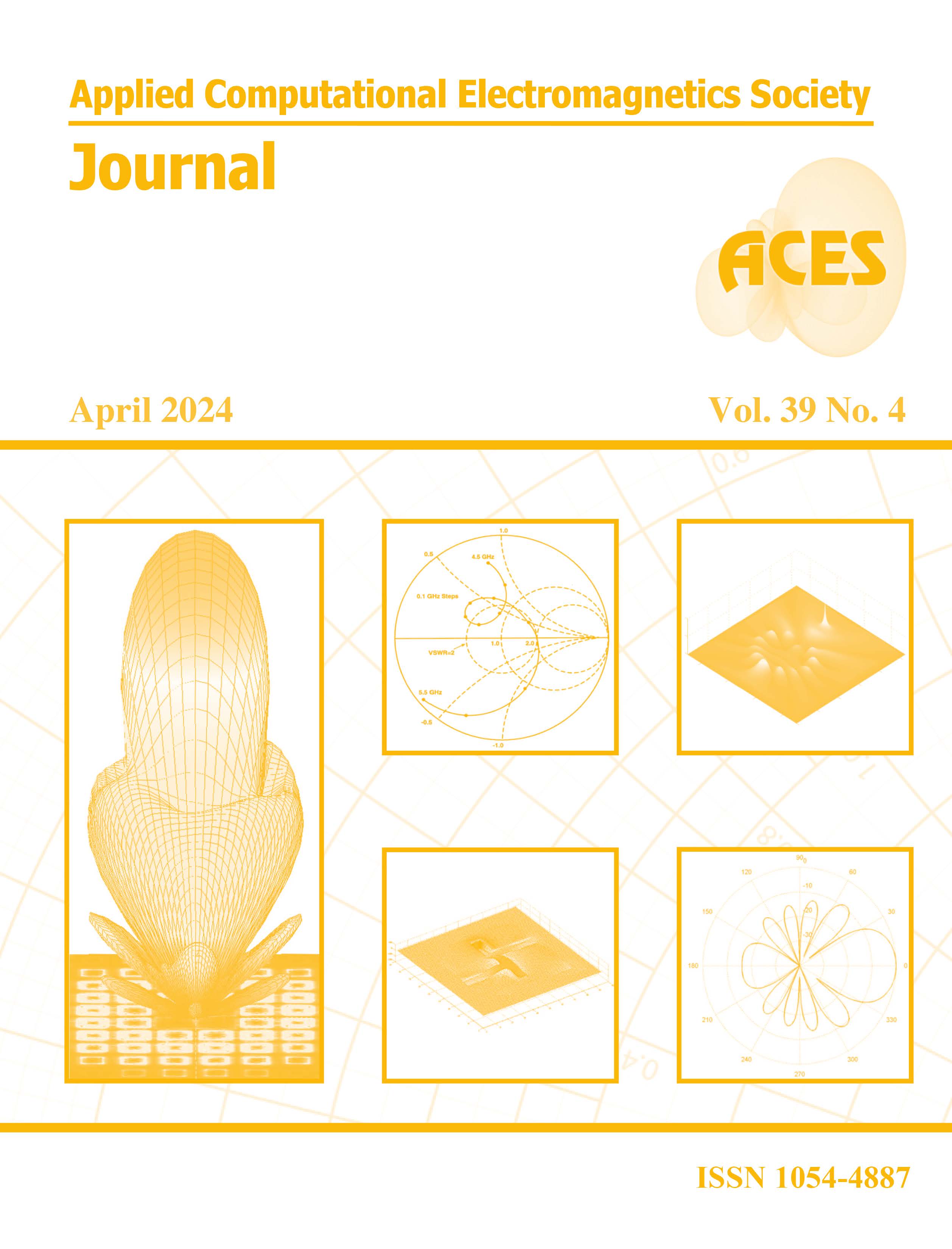Research on Variable Direction Wireless Power Transfer System based on Auxiliary Coils:
Theory, Simulation and Experimental Verification
DOI:
https://doi.org/10.13052/2024.ACES.J.390408Keywords:
Codirectional coil, variable direction coil, variable direction transfer, wireless power transferAbstract
In complex environments such as mines and pipelines, wireless power transfer (WPT) technology stands as a safe and convenient method for supplying power. However, in practical applications, the unavoidable angular misalignment between the sending and receiving coils results in decreased power. To address this issue, this paper proposes a variable direction WPT design method based on auxiliary coils. The mutual inductance of the system is analyzed with coils placed at different positions and incorporating multiple auxiliary coils. This paper conducts simulation and experimental analysis based on a 45∘ angle between the horizontal shaft and the slant shaft, showing a 14.92% increase in received power. The effectiveness of the proposed design method validates the feasibility of the technology and offers substantial support for practical applications.
Downloads
References
B. Sami and T. Mauro, “Theoretical study of different access points in coupled wireless power transfer - powerline communication systems,” Appl. Comput. Electromagn. Soc. J., vol. 33, no. 10, pp. 1112-1116, 2018.
X. Huang, Y. Dou, S. Lin, Y. Tian, and M. Andersen, “Synchronous push-pull class E rectifiers with load-independent operation for megahertz wireless power transfer,” IEEE Trans. Power Electron., vol. 36, no. 6, pp. 6351-6363, 2020.
D. Kim, A. T. Sutinjo, and A. Abu-Siada, “Near-field analysis and design of inductively-coupled wireless power transfer system in FEKO,” Appl. Comput. Electromagn. Soc. J., vol. 35, no. 1, pp. 82-93, 2020.
S. Li and C. Mi, “Wireless power transfer for electric vehicle applications,” IEEE J. Em. Sel. Top. P., vol. 3, no. 1, pp. 4-17, 2015.
Y. Gao, C. Duan, A. A. Oliveira, A. Ginart, K. B. Farley, and T. Zion, “Three-dimensional coil positioning based on magnetic sensing for wireless EV charging,” IEEE Trans. Transp. Electrification, vol. 3, no. 3, pp. 578-588, 2017.
X. Wu, P. Sun, S. Yang, L. He, and J. Cai, “Review on underwater wireless power transfer technology and its application,” Trans. China Electrotech. Soc., vol. 34, no. 8, pp. 1559-1568, 2019.
R. Sasaki, K. Koizumi, and S. Kiryu, “Wireless power transmission with a sown auxiliary coil to improve power efficiency for an implantable device,” Int. J. Appl. Electron., vol. 64, no. 1-4, pp. 843-851, 2020.
D. H. Sadek, H. A. Shawkey, and A. A. Zekry, “Multiband triple L-Arms patch antenna with diamond slot ground for 5G applications,” Appl. Comput. Electromagn. Soc. J., vol. 36, no. 3, pp. 302-307, 2021.
H. Sun, S. Hou, Y. Zhao, W. Yan, and Y. Wu, “Investigation of electromagnetic exposure of WPT coil to human body based on biological electromagnetic safety assessment,” Appl. Comput. Electromagn. Soc. J., vol. 36, no. 10, pp. 1355-1366, 2021.
H. Zhang, Z. Zhong, and W. Wu, “Adaptive compensation loop control method for dynamic range wireless power transfer in endoscopic capsules applications,” Appl. Comput. Electromagn. Soc. J., vol. 33, no. 5, pp. 499-504, 2018.
A. Kurs, A. Karalis, R. Moffatt, J. D. Joannopoulos, P. Fisher, and M. Soljacic, “Wireless power transfer via strongly coupled magnetic resonances,” Science, vol. 317, no. 5834, pp. 83-86, 2007.
Y. Guo, L. Wang, and C. Liao, “A general equivalent model for multi-coil wireless power transfer system analysis and its application on compensation network design,” Appl. Comput. Electromagn. Soc. J., vol. 33, no. 6, pp. 648-656, 2018.
A. K. Ranaweera, C. A. Moscoso, and J. W. Lee, “Anisotropic metamaterial for efficiency enhancement of mid-range wireless power transfer under coil misalignment,” J. Phys. D., vol. 48, no. 45, Art no. 455104, 2015.
S. Wang, C. Jiang, X. Tao, F. Chen, C. Rong, C. Lu, Y. Zeng, X. Liu, R. Liu, and B. Wei, “Enhancing the stability of medium range and misalignment wireless power transfer system by negative magnetic metamaterials,” Materials, vol. 13, no. 24, Art no. 5695, 2020.
P. Yadav and M. Veerachary, “Auxiliary coil based square coupler for wireless power transfer system,” IEEE Trans. Ind. Appl., vol. 58, no. 4, pp. 4980-4993, 2022.
X. Wang, C. Yu, Y. Wu, and J. Wang, “Structure design of quadrilateral overlapped wireless power transmission coupling coil,” Sensors, vol. 22, no. 16, Art no. 5955, 2022.
J. H. Cho, S. H. Jung, and Y. J. Kim, “Wireless power transfer for variable load, distance, and power division ratio in a loosely-coupledmultiple-receiver relay system,” IEEE Trans. Ind. Appl., vol. 70, no. 7, pp. 6809-6818, 2023.
W. Tang, Q. Zhu, J. Yang, D. Song, and R. Zou, “Simultaneous 3-D wireless power transfer to multiple moving devices with different power demands,” IEEE Trans. Power Electron., vol. 35, no. 5, pp. 4533-4546, 2019.
C. Liu, K. T. Chau, C. Qiu, and F. Lin, “Investigation of energy harvesting for magnetic sensor arrays on Mars by wireless power transmission,” J. Appl. Phys., vol. 115, no. 17, Art no. 17E702,2014.
A. Ali, N. Yasin, A. Rambe, I. Adam, N. Ramli, H. Rahim, T. Sabapathy, M. Norizan, and S. Sobri, “Analysis of symmetric two and four-coil magnetic resonant coupling wireless power transfer,” Appl. Comput. Electromagn. Soc. J., vol. 37, no. 4, pp. 497-506, 2022.
S. Liu, Y. Feng, W. Weng, J. Chen, J. Wu, and X. He, “Contactless measurement of current and mutual inductance in wireless power transfer system based on sandwich structure,” IEEE Trans. Emerg., vol. 10, no. 5, pp. 6345-6357, 2022.
X. Zhang, C. Xue, and J. Lin, “Distance-insensitive wireless power transfer using mixed electric and magnetic coupling for frequency splitting suppression,” IEEE Trans. Microw. Theory Tech., vol. 65, no. 11, pp. 4307-4313, 2017.
Z. Liao, S. Ma, Q. Feng, C. Xia, and D. Yu, “Frequency splitting elimination and utilization in magnetic coupling wireless power transfer systems,” IEEE Trans. Circuits Syst. I Regul. Pap., vol. 68, no. 2, pp. 929-939, 2021.




